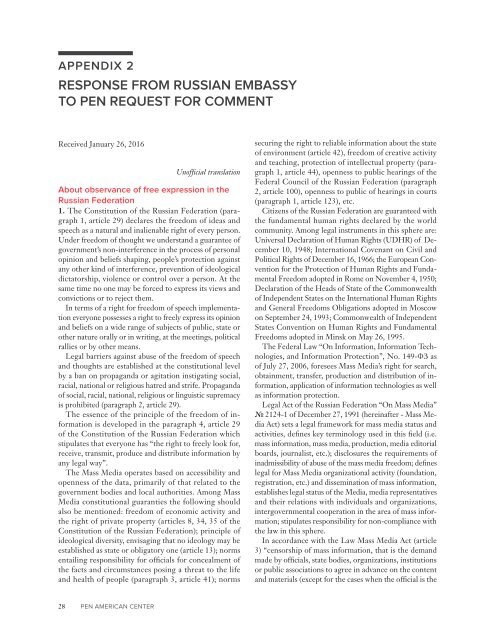DISCOURSE IN DANGER
2poGcgOv3
2poGcgOv3
You also want an ePaper? Increase the reach of your titles
YUMPU automatically turns print PDFs into web optimized ePapers that Google loves.
APPENDIX 2<br />
RESPONSE FROM RUSSIAN EMBASSY<br />
TO PEN REQUEST FOR COMMENT<br />
Received January 26, 2016<br />
Unofficial translation<br />
About observance of free expression in the<br />
Russian Federation<br />
1. The Constitution of the Russian Federation (paragraph<br />
1, article 29) declares the freedom of ideas and<br />
speech as a natural and inalienable right of every person.<br />
Under freedom of thought we understand a guarantee of<br />
government’s non-interference in the process of personal<br />
opinion and beliefs shaping, people’s protection against<br />
any other kind of interference, prevention of ideological<br />
dictatorship, violence or control over a person. At the<br />
same time no one may be forced to express its views and<br />
convictions or to reject them.<br />
In terms of a right for freedom of speech implementation<br />
everyone possesses a right to freely express its opinion<br />
and beliefs on a wide range of subjects of public, state or<br />
other nature orally or in writing, at the meetings, political<br />
rallies or by other means.<br />
Legal barriers against abuse of the freedom of speech<br />
and thoughts are established at the constitutional level<br />
by a ban on propaganda or agitation instigating social,<br />
racial, national or religious hatred and strife. Propaganda<br />
of social, racial, national, religious or linguistic supremacy<br />
is prohibited (paragraph 2, article 29).<br />
The essence of the principle of the freedom of information<br />
is developed in the paragraph 4, article 29<br />
of the Constitution of the Russian Federation which<br />
stipulates that everyone has “the right to freely look for,<br />
receive, transmit, produce and distribute information by<br />
any legal way”.<br />
The Mass Media operates based on accessibility and<br />
openness of the data, primarily of that related to the<br />
government bodies and local authorities. Among Mass<br />
Media constitutional guaranties the following should<br />
also be mentioned: freedom of economic activity and<br />
the right of private property (articles 8, 34, 35 of the<br />
Constitution of the Russian Federation); principle of<br />
ideological diversity, envisaging that no ideology may be<br />
established as state or obligatory one (article 13); norms<br />
entailing responsibility for officials for concealment of<br />
the facts and circumstances posing a threat to the life<br />
and health of people (paragraph 3, article 41); norms<br />
securing the right to reliable information about the state<br />
of environment (article 42), freedom of creative activity<br />
and teaching, protection of intellectual property (paragraph<br />
1, article 44), openness to public hearings of the<br />
Federal Council of the Russian Federation (paragraph<br />
2, article 100), openness to public of hearings in courts<br />
(paragraph 1, article 123), etc.<br />
Citizens of the Russian Federation are guaranteed with<br />
the fundamental human rights declared by the world<br />
community. Among legal instruments in this sphere are:<br />
Universal Declaration of Human Rights (UDHR) of December<br />
10, 1948; International Covenant on Civil and<br />
Political Rights of December 16, 1966; the European Convention<br />
for the Protection of Human Rights and Fundamental<br />
Freedom adopted in Rome on November 4, 1950;<br />
Declaration of the Heads of State of the Commonwealth<br />
of Independent States on the International Human Rights<br />
and General Freedoms Obligations adopted in Moscow<br />
on September 24, 1993; Commonwealth of Independent<br />
States Convention on Human Rights and Fundamental<br />
Freedoms adopted in Minsk on May 26, 1995.<br />
The Federal Law “On Information, Information Technologies,<br />
and Information Protection”, No. 149-ФЗ as<br />
of July 27, 2006, foresees Mass Media’s right for search,<br />
obtainment, transfer, production and distribution of information,<br />
application of information technologies as well<br />
as information protection.<br />
Legal Act of the Russian Federation “On Mass Media”<br />
№ 2124-1 of December 27, 1991 (hereinafter - Mass Media<br />
Act) sets a legal framework for mass media status and<br />
activities, defines key terminology used in this field (i.e.<br />
mass information, mass media, production, media editorial<br />
boards, journalist, etc.); disclosures the requirements of<br />
inadmissibility of abuse of the mass media freedom; defines<br />
legal for Mass Media organizational activity (foundation,<br />
registration, etc.) and dissemination of mass information,<br />
establishes legal status of the Media, media representatives<br />
and their relations with individuals and organizations,<br />
intergovernmental cooperation in the area of mass information;<br />
stipulates responsibility for non-compliance with<br />
the law in this sphere.<br />
In accordance with the Law Mass Media Act (article<br />
3) “censorship of mass information, that is the demand<br />
made by officials, state bodies, organizations, institutions<br />
or public associations to agree in advance on the content<br />
and materials (except for the cases when the official is the<br />
28 PEN AMERICAN CENTER


